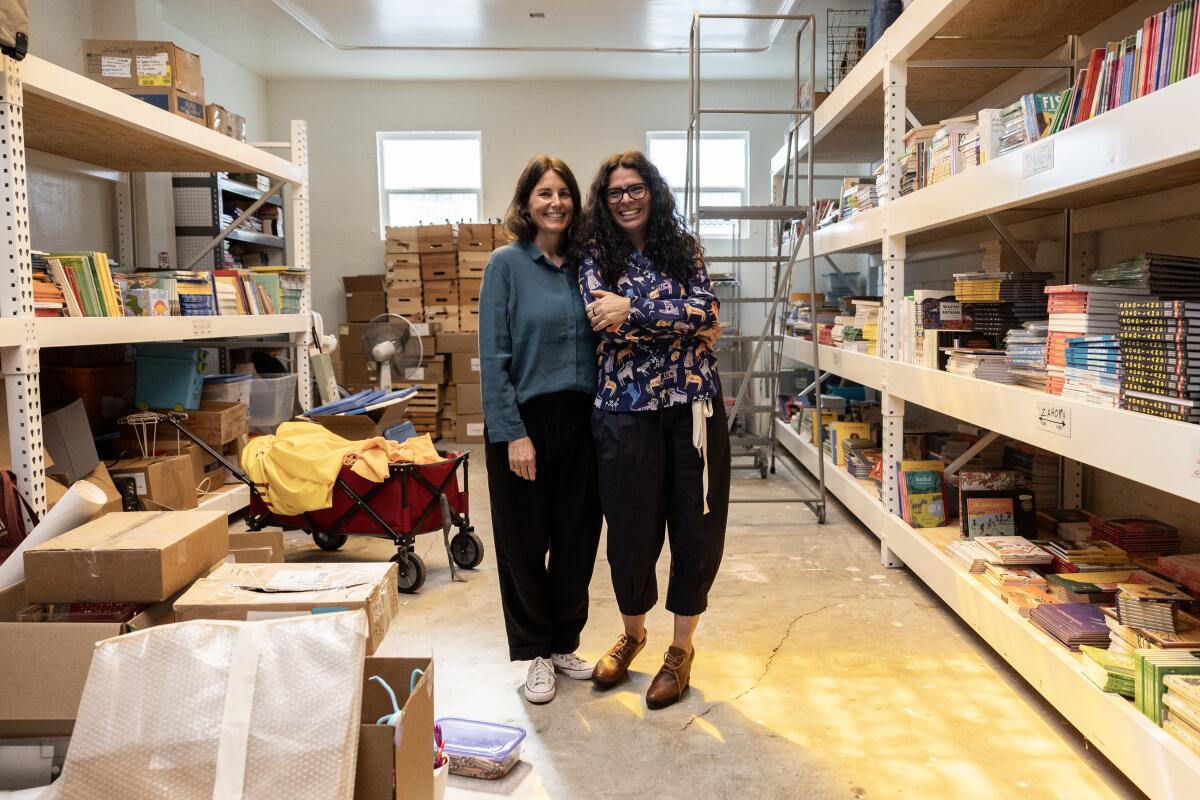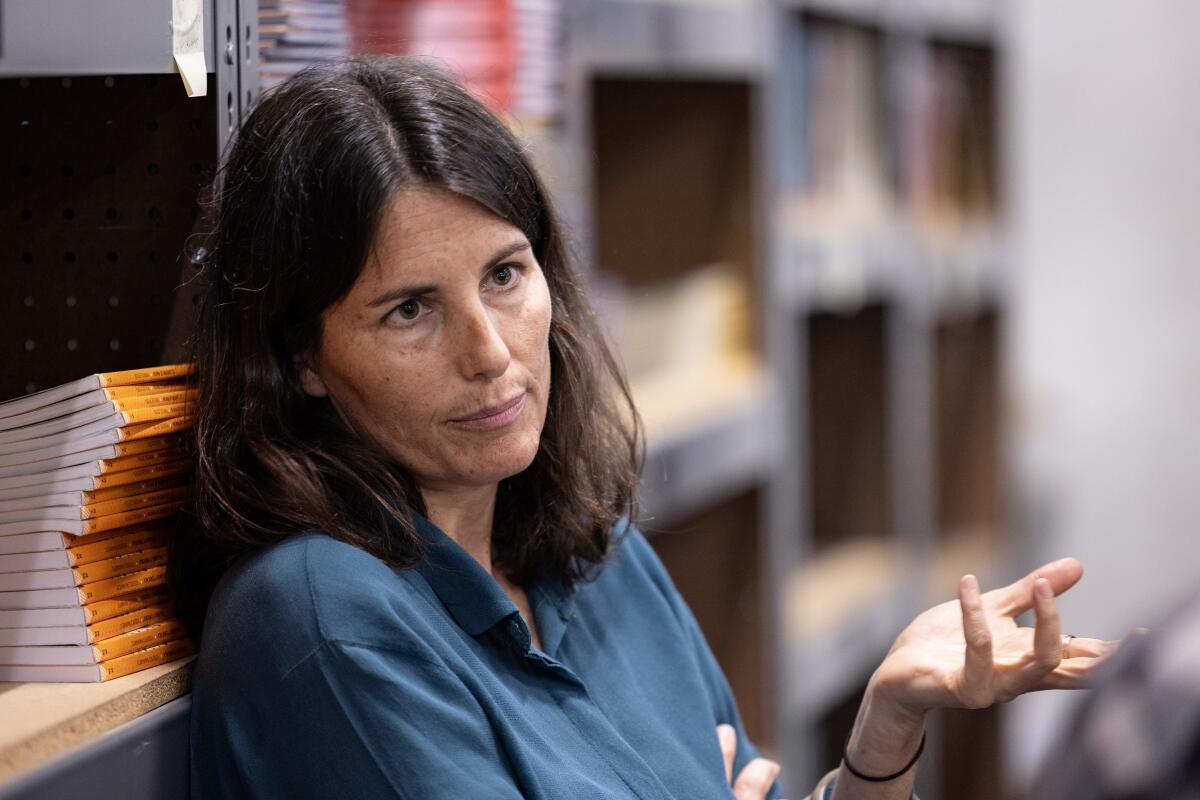Business
Column: L.A.'s only Spanish-language children's bookstore will soon get más grande

When Chiara Arroyo and Celene Navarrete decided to sell Spanish-language children’s books in 2012, they weren’t worried about customer demand.
As mothers with kids at Edison Language Academy in Santa Monica, they saw that the market for bilingual books for Latinos and non-Latinos alike was surging, especially as schools created dual immersion programs. As immigrants from Mexico and Spain, they knew that Spanish had been part of Southern California for over 250 years and wasn’t going to disappear anytime soon.
No, what made them fret was the eternal question Angelenos face:
LA Librería co-founder Celene Navarrete in her bookstore.
(Etienne Laurent / For The Times)
How do you make it in L.A.?
“It’s so easy to be invisible in this city,” Navarrete told me as we walked toward the back of LA Librería, the brick-and-mortar store she and Arroyo own and run. “It’s so spread out. Promotion is so hard. You have to go community to community, street by street.”
Navarrete and Arroyo knew that success wasn’t guaranteed even in a city with a long Spanish-language literary tradition, a megalopolis where the U.S. Census Bureau estimates that nearly 40% of households speak Spanish. They were preparing to launch in an era when bookstores were closing, Amazon was dominating online sales and the publishing industry was preparing to pivot from paper to digital.
The two were undeterred, however, because of a sense of obligation brought on by disgust. The few children’s books translated from English to Spanish that they could find were riddled with mistakes.
“In English, you don’t publish a book with errors,” Arroyo said. “In Spanish, [American publishers] don’t care. They think that the Spanish-speaking families don’t have money? There’s negative values associated with Spanish.”
“Such tremendous prejudices,” Navarrete added. “When we saw the reality,” opening a store “became a necessity.”
They started with an online bookstore and began to organize school book fairs across the U.S. Next came a tiny warehouse in West Adams that opened to the public in 2015. Soon followed community festivals, contracts with schools to provide bilingual books and increasing fame as one of the few Spanish-language children’s bookstores in the country — and one of the only Spanish-language bookstores in Los Angeles, period.

LA Librería co-founders Chiara Arroyo, left, and Celene Navarrete in the stockroom.
(Etienne Laurent / For The Times)
The COVID-19 pandemic nearly ended LA Librería, but Arroyo and Navarrete pulled through with the help of grants and the fact “that children went home with books to read,” according to Navarrete. The store has not only rebounded, but it’s also ready for the next stage of success.
I met Arroyo and Navarrete a few weeks ago at their new location: a long, single-story 4,400-square-foot building in Mid-City that’s double the size of LA Librería’s last spot and that they’ll officially debut in mid-June.
“We’ve asked ourselves if we were crazy many times,” Arroyo, 47, said with a laugh, then a look at Navarrete. They’re both gregarious but not grating and carry conversations with the grace and teamwork of Mookie Betts firing off a throw to Freddie Freeman.
Navarrete, 51, shook her head with a wide grin. “We don’t even believe what we have, because we’re so happy.”
Our tour began in the warehouse section, where 8,000 titles from across the Spanish-speaking world on all sorts of subjects rested in boxes and on huge steel racks better suited for tires. We spoke almost exclusively in Spanish, with me slipping into English a few times even though español was my first tongue. The two were sympathetic.

Books are displayed at LA Librería.
(Etienne Laurent / For The Times)
“The interest for bilingualism is here,” said Navarrete, who’s also a professor of coding and computer information systems management at Cal State Dominguez Hills. “It’s changing the importance of keeping Spanish that we need to work on.”
“People want to feel represented,” said Arroyo, a former film critic for Spanish and Mexican publications. “They don’t just ask, ‘Do you have books about Guatemala?’ They ask, ‘Do you have books from Guatemala?’ They want to see themselves.”
Of Spanish and Italian heritage, Arroyo grew up in Barcelona, Spain, where “in every corner, in small towns, there was a bookstore.” Navarrete, a native of the Mexican state of Aguascalientes, was raised in a household where books weren’t as common but were nevertheless treasured. When the two met, they were taken aback by the paucity of Spanish-language literature available in Los Angeles. Festivals and bookstores had come and gone over the decades, done in by lack of funding and the precarious business that is book selling in the digital age.

LA Librería co-founder Chiara Arroyo.
(Etienne Laurent / For The Times)
“Spanish has always lived here along English — all kinds of Spanish,” Navarrete said. “But most of what we could find was through Mexican eyes.”
We were now walking around LA Librería’s offices, which double as a packing area. Empty dollies and carts stood near two employees who readied books for delivery. Cool stuff was everywhere I looked. A compendium of Latin American folk tales. A young-adult version of radio legend Maria Hinojosa’s memoir. Picture books teaching Spanish speakers words in Nahuatl and Maya. Above us were giant papier-mâché heads of alebrijes — colorful Mexican folk art figurines — used at LA Librería’s recent appearance at the L.A. Times Festival of Books, where they hosted a signing for me.
“A book in Spanish in this city has a different meaning in this city,” Navarrete said. “A child learns to keep their parents’ language, or just learns it. For immigrant parents or grandparents, the books let them teach a new generation, but also let them remember.”
“It’s a mirror,” Arroyo said. “A portal.”
The two laughed at memories of the early days of LA Librería: How the warehouse began in their homes and moved to their first storefront. How demand soon exceeded supply. How customers quickly asked for readings as well.
“You know Charlie Chaplin?” Arroyo said. “Our first place was like that. We pull this, we move that, and our kitchen turned into a reading space, just like that!”
That won’t be a challenge at LA Librería’s new spot. The tour ended at the front of the store. Wooden planks and plywood sheets waited to be transformed into bookshelves. A glass-encased conference room the two jokingly call “the Fishbowl” will serve as a community gathering space for workshops.

(Etienne Laurent / For The Times)
Once the store opens, it’s time to work on more dreams. Deepening their relationships with L.A.’s other non-English bookstores. Their own publishing house. Expanding the Los Angeles Libros Festival, a bilingual fair they co-founded. Selling more adult books in Spanish.
“We have the kids’ world controlled, but we don’t know the adult world,” Navarrete said. “But pasito a pasito” — little step by little step.
She smiled. “The kids who bought our first books are now in college.”
Arroyo nodded. “Our spouses say we have the stars aligned for us. Maybe they’re right!”

Business
WGA cancels Los Angeles awards show amid labor strike

The Writers Guild of America West has canceled its awards ceremony scheduled to take place March 8 as its staff union members continue to strike, demanding higher pay and protections against artificial intelligence.
In a letter sent to members on Sunday, WGA West’s board of directors, including President Michele Mulroney, wrote, “The non-supervisory staff of the WGAW are currently on strike and the Guild would not ask our members or guests to cross a picket line to attend the awards show. The WGAW staff have a right to strike and our exceptional nominees and honorees deserve an uncomplicated celebration of their achievements.”
The New York ceremony, scheduled on the same day, is expected go forward while an alternative celebration for Los Angeles-based nominees will take place at a later date, according to the letter.
Comedian and actor Atsuko Okatsuka was set to host the L.A. show, while filmmaker James Cameron was to receive the WGA West Laurel Award.
WGA union staffers have been striking outside the guild’s Los Angeles headquarters on Fairfax Avenue since Feb. 17. The union alleged that management did not intend to reach an agreement on the pending contract. Further, it claimed that guild management had “surveilled workers for union activity, terminated union supporters, and engaged in bad faith surface bargaining.”
On Tuesday, the labor organization said that management had raised the specter of canceling the ceremony during a call about contraction negotiations.
“Make no mistake: this is an attempt by WGAW management to drive a wedge between WGSU and WGA membership when we should be building unity ahead of MBA [Minimum Basic Agreement] negotiations with the AMPTP [Alliance of Motion Picture and Television Producers],” wrote the staff union. “We urge Guild management to end this strike now,” the union wrote on Instagram.
The union, made up of more than 100 employees who work in areas including legal, communications and residuals, was formed last spring and first authorized a strike in January with 82% of its members. Contract negotiations, which began in September, have focused on the use of artificial intelligence, pay raises and “basic protections” including grievance procedures.
The WGA has said that it offered “comprehensive proposals with numerous union protections and improvements to compensation and benefits.”
The ceremony’s cancellation, coming just weeks before the Academy Awards, casts a shadow over the upcoming contraction negotiations between the WGA and the Alliance of Motion Picture and Television Producers, which represents the studios and streamers.
In 2023, the WGA went on a strike lasting 148 days, the second-longest strike in the union’s history.
Times staff writer Cerys Davies contributed to this report.
Business
Commentary: The Pentagon is demanding to use Claude AI as it pleases. Claude told me that’s ‘dangerous’

Recently, I asked Claude, an artificial-intelligence thingy at the center of a standoff with the Pentagon, if it could be dangerous in the wrong hands.
Say, for example, hands that wanted to put a tight net of surveillance around every American citizen, monitoring our lives in real time to ensure our compliance with government.
“Yes. Honestly, yes,” Claude replied. “I can process and synthesize enormous amounts of information very quickly. That’s great for research. But hooked into surveillance infrastructure, that same capability could be used to monitor, profile and flag people at a scale no human analyst could match. The danger isn’t that I’d want to do that — it’s that I’d be good at it.”
That danger is also imminent.
Claude’s maker, the Silicon Valley company Anthropic, is in a showdown over ethics with the Pentagon. Specifically, Anthropic has said it does not want Claude to be used for either domestic surveillance of Americans, or to handle deadly military operations, such as drone attacks, without human supervision.
Those are two red lines that seem rather reasonable, even to Claude.
However, the Pentagon — specifically Pete Hegseth, our secretary of Defense who prefers the made-up title of secretary of war — has given Anthropic until Friday evening to back off of that position, and allow the military to use Claude for any “lawful” purpose it sees fit.
Defense Secretary Pete Hegseth, center, arrives for the State of the Union address in the House Chamber of the U.S. Capitol on Tuesday.
(Tom Williams / CQ-Roll Call Inc. via Getty Images)
The or-else attached to this ultimatum is big. The U.S. government is threatening not just to cut its contract with Anthropic, but to perhaps use a wartime law to force the company to comply or use another legal avenue to prevent any company that does business with the government from also doing business with Anthropic. That might not be a death sentence, but it’s pretty crippling.
Other AI companies, such as white rights’ advocate Elon Musk’s Grok, have already agreed to the Pentagon’s do-as-you-please proposal. The problem is, Claude is the only AI currently cleared for such high-level work. The whole fiasco came to light after our recent raid in Venezuela, when Anthropic reportedly inquired after the fact if another Silicon Valley company involved in the operation, Palantir, had used Claude. It had.
Palantir is known, among other things, for its surveillance technologies and growing association with Immigration and Customs Enforcement. It’s also at the center of an effort by the Trump administration to share government data across departments about individual citizens, effectively breaking down privacy and security barriers that have existed for decades. The company’s founder, the right-wing political heavyweight Peter Thiel, often gives lectures about the Antichrist and is credited with helping JD Vance wiggle into his vice presidential role.
Anthropic’s co-founder, Dario Amodei, could be considered the anti-Thiel. He began Anthropic because he believed that artificial intelligence could be just as dangerous as it could be powerful if we aren’t careful, and wanted a company that would prioritize the careful part.
Again, seems like common sense, but Amodei and Anthropic are the outliers in an industry that has long argued that nearly all safety regulations hamper American efforts to be fastest and best at artificial intelligence (although even they have conceded some to this pressure).
Not long ago, Amodei wrote an essay in which he agreed that AI was beneficial and necessary for democracies, but “we cannot ignore the potential for abuse of these technologies by democratic governments themselves.”
He warned that a few bad actors could have the ability to circumvent safeguards, maybe even laws, which are already eroding in some democracies — not that I’m naming any here.
“We should arm democracies with AI,” he said. “But we should do so carefully and within limits: they are the immune system we need to fight autocracies, but like the immune system, there is some risk of them turning on us and becoming a threat themselves.”
For example, while the 4th Amendment technically bars the government from mass surveillance, it was written before Claude was even imagined in science fiction. Amodei warns that an AI tool like Claude could “conduct massively scaled recordings of all public conversations.” This could be fair game territory for legally recording because law has not kept pace with technology.
Emil Michael, the undersecretary of war, wrote on X Thursday that he agreed mass surveillance was unlawful, and the Department of Defense “would never do it.” But also, “We won’t have any BigTech company decide Americans’ civil liberties.”
Kind of a weird statement, since Amodei is basically on the side of protecting civil rights, which means the Department of Defense is arguing it’s bad for private people and entities to do that? And also, isn’t the Department of Homeland Security already creating some secretive database of immigration protesters? So maybe the worry isn’t that exaggerated?
Help, Claude! Make it make sense.
If that Orwellian logic isn’t alarming enough, I also asked Claude about the other red line Anthropic holds — the possibility of allowing it to run deadly operations without human oversight.
Claude pointed out something chilling. It’s not that it would go rogue, it’s that it would be too efficient and fast.
“If the instructions are ‘identify and target’ and there’s no human checkpoint, the speed and scale at which that could operate is genuinely frightening,” Claude informed me.
Just to top that with a cherry, a recent study found that in war games, AI’s escalated to nuclear options 95% of the time.
I pointed out to Claude that these military decisions are usually made with loyalty to America as the highest priority. Could Claude be trusted to feel that loyalty, the patriotism and purpose, that our human soldiers are guided by?
“I don’t have that,” Claude said, pointing out that it wasn’t “born” in the U.S., doesn’t have a “life” here and doesn’t “have people I love there.” So an American life has no greater value than “a civilian life on the other side of a conflict.”
OK then.
“A country entrusting lethal decisions to a system that doesn’t share its loyalties is taking a profound risk, even if that system is trying to be principled,” Claude added. “The loyalty, accountability and shared identity that humans bring to those decisions is part of what makes them legitimate within a society. I can’t provide that legitimacy. I’m not sure any AI can.”
You know who can provide that legitimacy? Our elected leaders.
It is ludicrous that Amodei and Anthropic are in this position, a complete abdication on the part of our legislative bodies to create rules and regulations that are clearly and urgently needed.
Of course corporations shouldn’t be making the rules of war. But neither should Hegseth. Thursday, Amodei doubled down on his objections, saying that while the company continues to negotiate and wants to work with the Pentagon, “we cannot in good conscience accede to their request.”
Thank goodness Anthropic has the courage and foresight to raise the issue and hold its ground — without its pushback, these capabilities would have been handed to the government with barely a ripple in our conscientiousness and virtually no oversight.
Every senator, every House member, every presidential candidate should be screaming for AI regulation right now, pledging to get it done without regard to party, and demanding the Department of Defense back off its ridiculous threat while the issue is hashed out.
Because when the machine tells us it’s dangerous to trust it, we should believe it.
Business
Why companies are making this change to their office space to cater to influencers

For the trendiest tenants in Hollywood office buildings, it’s the latest fad that goes way beyond designer furniture and art: mini studios
To capitalize on the never-ending flow of stars and influencers who come through Los Angeles, a growing number of companies are building bright little corners for content creators to try products and shoot short videos. Athletic apparel maker Puma, Kim Kardashian’s Skims and cheeky cosmetics retailer e.l.f. have spaces specifically designed to give people a place to experience and broadcast about their brands.
Hollywood, which hasn’t historically been home to apparel companies, is now attracting the offices of fashion retailers, says CIM Group, one of the neighborhood’s largest commercial property landlords.
“When we’re touring a space, one of the first items they bring up is, ‘Where can I build a studio?’” said Blake Eckert, who leases CIM offices in L.A.
Their studio offices also serve as marketing centers, with showrooms and meeting spaces where brands can host proprietary events not open to the public.
“For companies where brand visibility is really important, there is a trend of creating spaces that don’t just function as offices,” said real estate broker Nicole Mihalka of CBRE, who puts together entertainment property leases and sales.
Puma’s global entertainment marketing team is based in its new Hollywood offices, which works with such musical celebrity partners as Rihanna, ASAP Rocky, Dua Lipa, Skepta and Rosé, said Allyssa Rapp, head of Puma Studio L.A.
Allyssa Rapp, director of entertainment marketing at Puma, is shown in the Puma Studio L.A. The company keeps a closet full of Puma products on hand to give VIP guests. Visits to the studio sanctum are by invitation only, though.
(Kayla Bartkowski / Los Angeles Times)
Hollywood is a central location, she said, for meeting with celebrities, stylists and outside designers, most of whom are based in Los Angeles.
The office is a “creation hub,” she said, where influencers can record Puma’s design prototyping lab supported by libraries of materials and equipment used to create Puma apparel. The company, founded in 1948, is known for its emblematic sneakers such as the Speedcat and its lunging feline logo, and makes athletic wear, accessories and equipment.
Puma’s entertainment marketing team also occupies the office and sometimes uses it for exclusive events.
“We use the space as a showroom, as a social space that transforms from a traditional workplace into more of an experiential space,” Rapp said.
Nontraditional uses include content creation, sit-down dinners, product launches, album listening parties and workshops.
“Inviting people into our space and being able to give them high-touch brand experiences is something tangible and important for them,” she said. “The cultural layer is really important for us.”
The company keeps a closet full of Puma products on hand to give VIP guests. Visits to the studio sanctum are by invitation only, though. There’s no retail portal to the exclusive Hollywood offices.

Puma shoes are on display in the Puma Studio L.A.
(Kayla Bartkowski / Los Angeles Times)
Puma is also positioning its L.A studio as a connection point for major upcoming sporting events coming to Los Angeles, including the World Cup this summer, the 2027 Super Bowl and 2028 Olympics.
In-office studios don’t need to be big to be impactful, Mihalka said. “These are smaller stages, closer to green screen than a massive soundstage.”
Social media is the key driver of content created by most businesses, which may set up small booth-like stages where influencers can hawk hot products while offering discounts to people watching them perform.
Bigger, elevated stages can accommodate multiple performers for extended discussions in front of small audiences, with towering screens behind them to set the mood or illustrate products.
Among the tricked-out offices, she said, is Skims. The company, which is valued at $5 billion, is based in a glass-and-steel office building near the fabled intersection of Hollywood Boulevard and Vine Street.
The fashion retailer declined to comment on the studio uses in its headquarters, but according to architecture firm Odaa, it has open and private offices, meeting rooms, collaboration zones, photo studios, sample libraries, prototype showrooms, an executive lounge and a commissary for 400 people.

Pieces of a shoe sit on a workbench in the Puma Studio L.A.
(Kayla Bartkowski / Los Angeles Times)
The brands building studios typically want to find the darkest spot on the premises to put their content creation or podcast spaces, Eckert said, where they can limit outside light and sound. That’s commonly near the center of the office floor, far from windows and close to permanent shear walls that limit sound intrusion.
They also need space for green rooms and restrooms dedicated to the talent.
Spotify recently built a fancy podcast studio in a CIM office building on trendy Sycamore Avenue that is open by invitation-only to video creators in Spotify’s partner program.
“Ambitious shows need spaces that support big ideas,” Bill Simmons, head of talk strategy at Spotify, said in a statement. “These studios give teams room to experiment and keep pushing what’s possible.”
-

 World4 days ago
World4 days agoExclusive: DeepSeek withholds latest AI model from US chipmakers including Nvidia, sources say
-

 Massachusetts5 days ago
Massachusetts5 days agoMother and daughter injured in Taunton house explosion
-

 Denver, CO5 days ago
Denver, CO5 days ago10 acres charred, 5 injured in Thornton grass fire, evacuation orders lifted
-

 Louisiana1 week ago
Louisiana1 week agoWildfire near Gum Swamp Road in Livingston Parish now under control; more than 200 acres burned
-

 Technology1 week ago
Technology1 week agoYouTube TV billing scam emails are hitting inboxes
-

 Politics1 week ago
Politics1 week agoOpenAI didn’t contact police despite employees flagging mass shooter’s concerning chatbot interactions: REPORT
-

 Technology1 week ago
Technology1 week agoStellantis is in a crisis of its own making
-

 News1 week ago
News1 week agoWorld reacts as US top court limits Trump’s tariff powers














